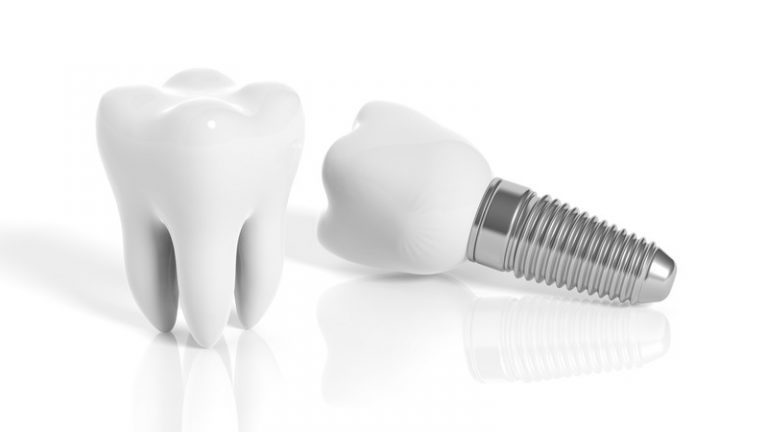It’s widely agreed upon that dental implants are the most comprehensive and holistic way to replace missing teeth. They’re the only oral reconstruction method that replaces part of the biological function of your natural tooth, because they’re placed into the jawbone. Unlike dentures, which eventually stop fitting and also do nothing to stop your jaw from shrinking as you age, dental implants do not need replaced and preserve the density of your jawbone.
The caveat with dental implants is that your jaw has to be healthy enough to take them in the first place; an unhealthy jaw won’t integrate with the implant, and the implant will eventually fail. Some patients with borderline-eligible jaw health can undergo dental bone grafting and then get implants. But if a patient’s jaw is too weak, there hasn’t so far been a way to offer them a reconstruction method that includes these prosthetic teeth.
The newest in dental implant technology is trying to change all that. Mini dental implants are just a small version of traditional dental implants, but function the same way. As well, above the gum line, the crown on the implant – mini or not – is the same. What does this mean for patients who need their teeth replaced in a permanent way? Let’s take a look at the pros and cons of mini dental implants:
Benefits of Mini Dental Implants
Oral surgeons are always striving to make surgical procedures less invasive and at the same time more effective. The goals behind mini dental implants are twofold:
- Create a less-invasive, shorter-term dental implant process.
- Create a dental implant that a wider range of patients are eligible for.
These tiny versions of dental implants are about the size of a toothpick – less than 3mm across. Traditional implants are around 5mm across. This smaller size means patients with poor jaw health – including those who have worn dentures for many years – can have mini dental implants installed.
To compensate for their size, mini tooth implants are just one piece, as opposed to traditional dental implants, which are comprised of two. Since they’re only one piece, mini dental implants can be installed above the gum line, resulting in a less-invasive, one-step surgical procedure.
Traditional dental implants are installed below the gum line and require 2 invasive procedures before you can install the crown. They also come with a longer healing time, as traditional tooth prosthetics rely more on osseointegration than their mini counterparts.
While mini dental implants are most often used to stabilize dentures, they can be used the same way as traditional dental implants as well. Other advantages of this new development in tooth replacement technology include:
- Can be done without any jaw bone grafting
- Can fit in smaller or hard-to-reach areas of the mouth
- Faster recovery period
- Less post-surgical discomfort
- Lower cost
In addition, some patients may find that mini dental implants look better than standard-size ones; since there’s no abutment piece, you’re less likely to have the eventual dark line at the gums some people experience with traditional artificial teeth.
Drawbacks to Mini Dental Implants
The main issue with mini dental implants is that they’re new. Sure, they’re very similar to regular dental implants, just sized down, but we don’t know exactly what that sizing-down means long-term, because they are so new. Issues with mini dental implants include:
- Higher rate of loosening and breaking post-procedure
- Less stability than standard dental implants
- Limited knowledge of the possibility of long-term implant survival
- Need for more than one implant
- Screw breakage during implantation
- Temporary; will need replaced after a few years
- Not a good option for those who clench/grind their teeth
Mini Dental Implants: Progress or Passing Trend?
So, what does all this mean? Are mini dental implants worth it? And who do they make sense for? The answer is still unclear. We can see the potential for these smaller implants to greatly improve and expand-upon what standard dental implants are currently capable of, but we simply don’t yet know the long-term usability of mini dental implants.
If anything, this new development in oral surgery is probably is a step in the right direction, on the path towards making holistic, complete tooth replacement a possibility for all kinds of patients. Because everyone deserves a beautiful, functional, healthy smile.








